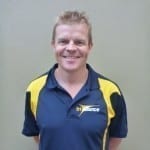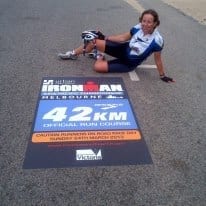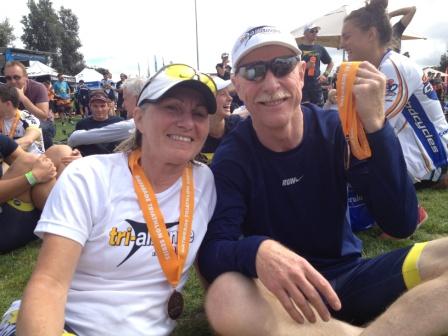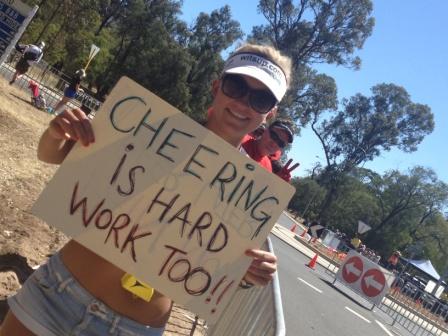Lasting the Distance in Triathlon

The year was 1990; I was at Suttons Beach Redcliffe preparing for what was to be my first triathlon. Physically, I could have timed my entry to the sport better as, after recent major back surgery and three months of confinement in a neck-to-waist plaster cast, I was skin and bone. Emotionally, I was primed to dust off the cast residue and awaken a body softened by three months of enforced rest. Ironically, I have the nightmare of major surgery followed by weeks lying flat on my back in bed to thank for introducing me to a sport that is not only my passion but also career.
As soon as the plaster was cut I asked my surgeon what I should do now and, with a bedside manner well below the standard of his operating skills, he replied, “I don’t care.” Swimming came first, followed by cycling, as I grew stronger running became comfortable and inevitably I found myself on Suttons Beach attempting to combine all three.
Twenty-three years later and another back surgery, six more operations elsewhere, a couple of bouts of glandular fever, numerous soft tissue injuries and a couple of broken bones hasn’t dimmed my love of our sport. I’m not ashamed to wear the ‘triathlon/multisport tragic’ label. Despite the battles there have been many, many highs including the opportunities to compete in a number of multisport events in Australia and overseas, representing Queensland at a national level for cross country running and Australia at age group international level for triathlon. I have met, trained under and coached such a wide variety of people from the stay-at-home parent attempting to shed some kilos to the world’s best athletes at age group and professional level. Every experience and person teaches me something new and I can’t fathom a life without training or competition. However, sadly, this isn’t the case for everyone.
At the recent Noosa Triathlon I was reminiscing on the early days, recalling some of those I trained and raced with in 1990 and those first few years of competition. It struck me that very few, in fact only a handful still remain in the sport.
From my experience many people don’t last more than three years before calling it quits, mostly because they fail to recover properly and take regular breaks from training. I’m no saint when it comes to training and ignoring my body’s aches and pains however I have always scheduled in rest and limit training volume.
Training and racing friends who clocked up huge hours of training, on top of careers and family commitments, enjoyed some satisfying short-term results but they came at a heavy price including permanent injury, mental burnout and inevitably giving up the sport. This common predicament does not do triathlon justice.
I believe triathlon training should be a part of our lives but not at the sacrifice of enjoyment. If you can find the balance, you’ll reap the benefits.
Here are my top 10 tips to lasting the distance in triathlon:
- Don’t do big volume training. Big volume training differs with every individual but for most age groupers anymore than 15 hours per week is not sustainable over a long period of time. If you’re training for an Ironman then, yes, volume may exceed this for an 8-12 week period. Quality training however will achieve great results on a lower volume, higher intensity workload.
- Take regular breaks from training and racing. With the every-increasing duration in season, it is important to let the body rest and recover. A couple of short 1-2 week breaks and then one 3-4 week break from training is imperative every year.
- Don’t attempt long distance racing. Unless you have completed at least 18 months to 2 years of consistent training and had experience over numerous shorter distances.
- Similarly, don’t attempt big events. At least not until you have 18 months to 2 years of consistent training and racing experience. World Champs, Ironman and 70.3 races are the ‘big’ events and often challenges to work towards but by doing them too early in your triathlon career more low-key events lose their importance. These days, there is a wide variety of events providing great experiences.
- Take pleasure in the little victories. It is not always about the race but sometimes things like time trial pb’s, having a great training session or enjoying the sunrise on a beautiful morning ride.
- Try different events/sports. Keep it interesting and try some swimming, cycling and running events on their own. Mountain biking and adventure racing are also great fun and keep you aerobically fit.
- Be grateful. Your health and, fitness is not something to be taken for granted. Be grateful for it and the fact you can swim, bike and run for fun. There are many in the community who would love to but can’t.
- Be consistent physically and mentally. Get into a routine that allows you to train consistently but also work on keeping an even keel mentally. Enjoy the peaks the sport has to offer, but also when in the valleys know that you’ll come out of it.
- Enjoy the success of your friends. Celebrate when a friend has a great result, let them know how proud you are of their achievement. Recognition from our peers is a fantastic feeling so go out of your way to tell someone, well done.
- Challenge yourself. Don’t be afraid to put yourself out there and do something that is going to really extend you. It is when we get out of our comfort zone that we truly find out what we’re capable of.
Discover more from Tri Alliance Triathlon Community
Subscribe to get the latest posts sent to your email.






